|
|
|
Sort Order |
|
|
|
Items / Page
|
|
|
|
|
|
|
| Srl | Item |
| 1 |
ID:
103106
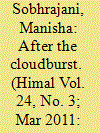

|
|
|
| 2 |
ID:
192472
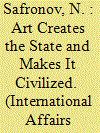

|
|
|
|
|
| Summary/Abstract |
Armen Oganesyan, Editor-in-Chief, International Affairs: Nikas Stepanovich [Safronov], you once quoted from Ilya Ehrenburg's People, Years, Life: "In the past, eternal ideas were written down with goose quills, and today, goose ideas are written down with eternal quills. " What if we were to talk about brushes instead of quills? How would you assess today's level of artistic development?
|
|
|
|
|
|
|
|
|
|
|
|
|
|
|
|
| 3 |
ID:
145750
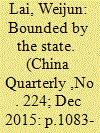

|
|
|
|
|
| Summary/Abstract |
From a regulatory perspective, philanthropy in China has been officially modernized. Since the government established a legal framework in 2004 based on models from overseas, the number of private foundations in China has grown more than six-fold. Drawing on a nationally representative survey of 214 private foundations conducted in 2012, we present a landscape view of these new philanthropic institutions, discussing both who begins foundations and how their monies are used. We find that despite the rise of new private wealth in China and the adoption of the private foundation form, government priorities are structuring the field of Chinese philanthropy in key and consequential ways. We conclude with some considerations of the implications of these findings for the development of broader civil society.
|
|
|
|
|
|
|
|
|
|
|
|
|
|
|
|
| 4 |
ID:
164419
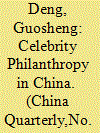

|
|
|
|
|
| Summary/Abstract |
This article provides the first comprehensive analysis of the development of, and public responses to, celebrity-fronted philanthropy in the People's Republic of China. It explores the extent and nature of celebrity philanthropy with reference to a sample of mainland Chinese celebrities in entertainment and sports. It then draws on interviews conducted with employees of large charities to examine the kinds of links that are being forged between China's not-for-profit sector and commercial organizations managing the work of celebrities. Finally, it analyses the responses to a national survey on celebrity and philanthropy. We conclude that the relationship between China's government, not-for-profit and celebrity sectors is becoming more professionalized and organized. This development reveals how the roles and capacities of government are being reconfigured and expanded, even as it also enhances the scope for action and the influence of new social actors and organizations to address government-led national development issues.
|
|
|
|
|
|
|
|
|
|
|
|
|
|
|
|
| 5 |
ID:
158561
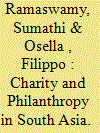

|
|
|
|
|
| Summary/Abstract |
Why should we care about giving in modern South Asia, and why now? These are among the questions at the forefront of this special issue whose contributors explore charitable practices and philanthropic transformations in diverse historical and cultural contexts across the colonial/post-colonial divide at a time when trade liberalization, the transformation of state welfare-ism, and the consolidation of a global economy has led to a deepening of neo-liberal regimes across the region as well as political and religious fundamentalisms. We also write at a time when non-governmental organizations have proliferated across the region, as has the discourse regarding humanitarian aid for a diverse range of development projects. This special issue, then, seeks to throw light on what is new and different, and what persists in the context of the region's long and well-established traditions of giving. Who gives and toward what purposes and with what stated intentions? How have acts of giving changed over time and across cultural, religious, and regional complexes? What are the institutional frameworks within which specifically local, national and regional mechanisms and instruments of giving intersect with global practices? How do the economic and financial incentives interact with ethical and affective imperatives to give?
|
|
|
|
|
|
|
|
|
|
|
|
|
|
|
|
| 6 |
ID:
075045
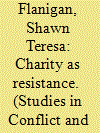

|
|
|
|
|
| Publication |
2006.
|
| Summary/Abstract |
This article explores two ways of conceptualizing ties between charity, contentious politics, political violence, and terrorism. The first half of the article discusses how social and political exclusion serve as motivations for within-group philanthropy, political activism, and political violence. Using this conceptualization, charity and terrorism can be seen as two activities among a range of possible actions that address grievance and exclusion. The second half of the article discusses how terrorist organizations and political insurgents use charity as a tool to move community members along a "continuum of community support" toward greater acceptance of and participation in violent activities.
|
|
|
|
|
|
|
|
|
|
|
|
|
|
|
|
| 7 |
ID:
154211
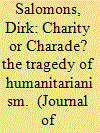

|
|
|
| 8 |
ID:
153635
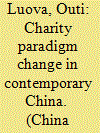

|
|
|
|
|
| Summary/Abstract |
This article addresses a remarkable conceptual change in China: the replacement of the perception of charities as organizations associated with anti-governmental activity by one that views charities as organized expressions of civic duty. This shift occurred within a period of just 20 years. Following theories of public policy paradigm change, this study analyses the specific societal, institutional and rhetorical changes that were required for the rehabilitation of charity in China; the articulation of a blueprint for the new paradigm; and the implementation of the model in practice, focusing on attempts to foster a charitable spirit and culture. This study is based on official documents and articles in the People’s Daily (人民日报). Furthermore, the analysis is complemented by interviews with staff members of charity associations carried out in Tianjin in 2007 and 2008. The findings contribute to the broader discussion of the features of China’s civil society by elaborating on the boundaries of acceptable civic action. The study shows how the party-state has permitted the emergence of a space for the expression of a voluntary charitable spirit while still expecting that charitable spirit to be expressed within the confines of state-defined morally correct acts.
|
|
|
|
|
|
|
|
|
|
|
|
|
|
|
|
| 9 |
ID:
158206
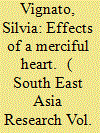

|
|
|
|
|
| Summary/Abstract |
In this article, I examine the relationship of charitable help that, through the persons and the work of caregivers, connects some donors to the young persons who grow up in home-based childcare institutions in contemporary Malaysia. The prism of my analysis is the small charity functions that take place within the homes that I have studied, which allow donors and receivers to elaborate, perfect and enact moral ideas of themselves and of their place in society. Because they stage the main characters of charity, the functions also give an insight into how, since an early age, children actively explore the dominant and largely ethnicized model of virtue and merit they are summoned to embody, thus making sense of their shared condition of “charity children”. This self-care work, I argue, inspired by Erica Bornstein’s study on Indian charity, is made possible by the “pure gift” core that characterizes donors and caretakers, as it frees the aided children from the necessity to “buy” their care back, which is otherwise requested in traditional child fostering.
|
|
|
|
|
|
|
|
|
|
|
|
|
|
|
|
| 10 |
ID:
155718
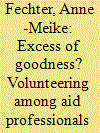

|
|
|
|
|
| Summary/Abstract |
This article explores the meaning of volunteering among professional aid workers. While they experience disenchantment in their daytime work, volunteering provides them with benefits lacking in their paid jobs. At the same time, a compensatory model does not capture the complex dimensions of this relationship. One motive behind their professional work – bringing about positive change for others – is also the driving force behind their voluntary practices. Such excess of doing good may be indicative of their overall commitment. If aid workers make sense of their actions within a framework of alienated labour, rendering their waged aid work as a commodity, volunteering emerges as a remedial response. At the same time, their paid and unpaid work is animated by the impulse of giving. Such co-existence implies that gifts and commodities are not mutually exclusive; or indeed that both can be understood, following Parry (1986), as emerging from a highly developed capitalist system.
|
|
|
|
|
|
|
|
|
|
|
|
|
|
|
|
| 11 |
ID:
113648
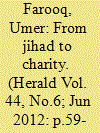

|
|
|
| 12 |
ID:
155719
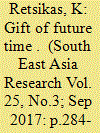

|
|
|
|
|
| Summary/Abstract |
The attainment of religiously informed and socially responsible wealth is a desire widespread in the metropolises of Java, Indonesia, especially amongst the pious middle classes. This article aims at an understanding of the emergence and effects of an early 21st century desire for pious entrepreneurial success, by focusing on the practices people consistently and regularly undertake in order to actualise this. It claims that the religiously informed desire for entrepreneurial success is permeated by a mode of temporality that privileges the future at the expense of the past and the present. This temporal orientation has important consequences for subject-making, as it forces the subjectivities created to take a distinctively asymptotic form, resulting in the production of self-differing subjects; that is, subjects in which past, present and future actualisations lack coincidence and complete convergence.
|
|
|
|
|
|
|
|
|
|
|
|
|
|
|
|
| 13 |
ID:
165218
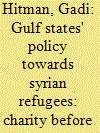

|
|
|
|
|
| Summary/Abstract |
The regional turmoil in the Middle East since December 2010 has provided researchers with many topics for research. Despite a relatively large number of studies in recent years, none of them deal with one of the central questions – namely, the attitude of the Gulf States toward the misery of the Syrian refugees. While more than six million Syrians fled their homeland and became refugees, 1.5 million in Europe, few, if any, succeeded in relocating to the Gulf States.
|
|
|
|
|
|
|
|
|
|
|
|
|
|
|
|
| 14 |
ID:
084588


|
|
|
| 15 |
ID:
024660


|
|
|
|
|
| Publication |
Oxford, University Press, 1986.
|
| Description |
xvii, 440p.
|
| Standard Number |
0192615432
|
|
|
|
|
|
|
|
|
|
|
|
Copies: C:1/I:0,R:0,Q:0
Circulation
| Accession# | Call# | Current Location | Status | Policy | Location |
| 027605 | 362.87/HAR 027605 | Main | On Shelf | General | |
|
|
|
|
| 16 |
ID:
169283
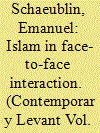

|
|
|
|
|
| Summary/Abstract |
Zakat is the Islamic obligation to give away a share of one’s moveable wealth for the sake of the community—primarily supporting people in need. Based on fieldwork in the Palestinian city of Nablus (2013–2014) where institutional channels for distributing zakat had become blocked due to security crackdowns in 2008, this article analyses direct zakat practices where givers and receivers confront one another in face-to-face interaction. In Nablus, openly displayed material want was assumed to ‘expose’ people living in poor households as well as their relatives and neighbours. Against this background, direct zakat manifested itself as discreet gestures of ‘covering’ need, while people not asking openly for support tended to be praised for their shyness and piety. In direct zakat transfers, people actively cared for how they appeared to one another in social interactions. This ‘ethical work’ of presenting oneself involved reading signs, embodying Muslim virtues and invoking God as the sole source of material provision. Considering the Islamic tradition’s presence within social interactions, this article seeks to understand how Muslim piety exceeds the individual and how the moral responsibility to cover the needs of others is socially distributed.
|
|
|
|
|
|
|
|
|
|
|
|
|
|
|
|
| 17 |
ID:
099453
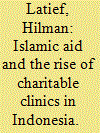

|
|
|
|
|
| Publication |
2010.
|
| Summary/Abstract |
By exploring Islamic charitable clinics in Indonesia, this paper shows how community-based initiatives and zakat [Islamic charitable obligation] agencies have provided wider access to viable health services for destitute families in poor urban and rural areas. Zakat agencies, with their charitable clinics, have recently gained strong support from both society and the government. They have, for example, tried to bring a community response to the current social economic challenges through the revitalization of the zakat and Islamic charity practice. Low-priced, accessible and free medical assistance for poorer families and small economic enterprises provided by the zakat agencies reflect the endeavours of middle class Indonesian Muslims to translate Islamic discourse on social welfare in a more concrete way. The rise of Islamic charitable clinics, whose origins and motives can partly be linked to the Islamic discourse of the welfare of the ummah [the Islamic community], is without doubt a consequence of emerging interpretations of the meaning and function of Islamic aid in contemporary Indonesian Islam.
|
|
|
|
|
|
|
|
|
|
|
|
|
|
|
|
| 18 |
ID:
155891


|
|
|
|
|
| Summary/Abstract |
The article probes the effects of Islamic doctrine on the allocation of hydrocarbon revenues and vice versa and the significance of this relationship for politics. It explores two areas of (state-directed) distributive activity—government subsidies and charitable giving—in Saudi Arabia, Kuwait, Qatar, and Oman. It demonstrates how both oil revenues and Islamic doctrine are mobilized to consolidate state authority and how both have been manipulated and deliberately interconnected as tools of state power.
|
|
|
|
|
|
|
|
|
|
|
|
|
|
|
|
| 19 |
ID:
090513
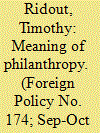

|
|
|
|
|
| Publication |
2009.
|
| Summary/Abstract |
In Latin America, the culture of philanthropy is not a strong as in other parts of the world. Charity has always been present there, but it is often informal and done through personal relationships or the Church.
|
|
|
|
|
|
|
|
|
|
|
|
|
|
|
|
| 20 |
ID:
155364


|
|
|
|
|
| Summary/Abstract |
International Affairs: Natalya Ivanovna, your name has for decades been strongly associated primarily with information security. What does your Info Watch Group do these days?
|
|
|
|
|
|
|
|
|
|
|
|
|
|
|
|
|
|
|
|
|